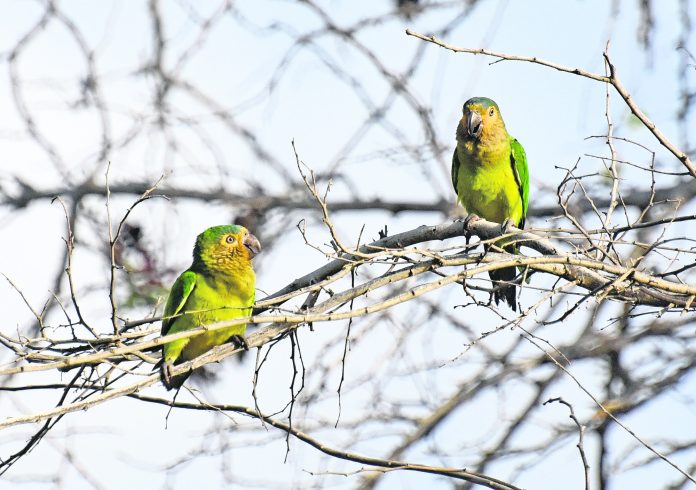Arikok National Park has a conservation plan in process for the parakeets of Aruba. Preparation surveys have been carried out in the past, as well as analysis of the situation of the local parakeets in Aruba, studying the areas where they live, the dangers they face, and the different ways to preserve this bird.
Currently it can be said that not all is well with the Prikichi – Aruba’s endemic brown-throated parakeet – and there needs to be a strong push for awareness in the local community, together with an action plan for the conservation of this unique bird.
Giancarlo Nunes, Research & Conservation Manager at the Arikok National Park Foundation explained to our reporter that all around the world, the parrot species is in danger, and all around the world there have been successful programs for bringing back some of these birds.
The foundation had this analyzed and based on all the collected results they created an action plan for the conservation of the Prikichi. This is something that they’re currently busy with, and something that has various aspects like a survey on the sort of food that is still available for the bird, the situation of animals that were introduced to Aruba that are a danger to Prikichi – dogs, cats and boas – but also people who grab the Prikichi from their nest to stick into a cage or to sell.
“In this process, a lot of nests are lost, so with all these threats we wrote a conservation program that involves different aspects to expand the Prikichi population”, Mr. Nunes said. This will consist of a breeding program to create more Prikichi, but also it is necessary to start by knowing how many Prikichi are still left in Aruba. A survey also needs to be carried out on the nests that are still present, which is one of the bigger problems because Prikichi like to make their nests in very old, very big trees, and there are not a lot of these sort of plants left. Aruba has a lot of pest control, and Prikichi likes to nest where there are termites, so this bird is losing its nesting areas very fast.
A lot of attention needs to be given to awareness, so the local community is aware that a Prikichi does not belong in a cage – not even to save them from a dog or cat, even when done with a good heart, it doesn’t help their population. “They need to be free, they need to fly around and breed in order for the population to come back”, Mr. Nunes explains. The foundation will begin focusing also on reducing, through awareness, the instances of people coming into nature to seek Prikichi and taking them from their nests to bring home. Also there is a need to reduce the amount of cats on the streets, better control of the boa population, and see how other forms or programs of breeding can be introduced, for example by using artificial nests, as is being done with Aruba’s burrowing owl, the Shoco.
All these programs, with their different aspects attached, have duration of at least ten years to be executed properly. Things always start with analysis, dialogue with stakeholders and the government – because the foundation cannot do things on their own, there is a lot that needs to be done in a team together with the government, and it is a very long process. All programs for species conservation take at least ten years to execute and develop, but according to Mr. Nunes, it will likely take more than ten years.
Back in the 90s, there were four very important areas in Aruba where Prikichi slept together, in large groups called roosting grounds. Right now, the foundation visited all these areas, and there are no Prikichi there. “That is also something very alarming that we need to be aware of, not all is well with the Prikichi. We need to take action to preserve this species, which is a unique endemic species only found on Aruba. If lost, we cannot bring it from anywhere else”, Nunes explains.
The Prikichi that we have here is something that is Aruba’s own, part of our natural and cultural identity which really is part of who we are as Arubans. According to the foundation, it is very important to work to save this bird.
The foundation said that something that surely the community of Aruba can do to help the Prikichi is planting more fruit trees in your yard. Not just laying cement, but at least plant a few fruit trees and let them grow large, like mango, mispel and others. “This will greatly help the Prikichi population. The more food we can produce for them, the better their situation will become.”




















